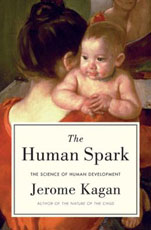"1. Infancy: Feelings of warmth, cold, pain, hunger, excitement, and uncertainty in reaction to unexpected events
"2. The second year: Empathy, some forms of anxiety, and initial interpretations of some feelings
"3. Two to six years: Shame, guilt, jealousy, sadness, happiness
"4. Six to ten years: Most adult emotions possible, including disgust
"5. Adolescence: Add the emotions of cognitive dissonance, hopelessness, and romantic love
— Figure 7.4 The stages in development of emotion
"Early adolescents between twelve and fifteen years of age are capable of most of the emotional repertoire of adults. . . . Adolescents who detect semantic inconsistencies in a set of related beliefs are vulnerable to the emotion that psychologists call cognitive dissonance. The ability to appreciate that uncontrollable events can interfere with the self's plans renders adolescents susceptible to the emotions English calls helpless, despairing, or impotent if the individual believes he has no way to cope with the situation.
"The increase at puberty in the brain's secretion of dopamine helps to explain the heady, often unrealistic optimism that many youth display. This emotion could be due, in part, to the increased muscle tone generated by this molecule. Even some older adults temporarily feel that they can conquer the world after an hour of strenuous exercise. The increased secretion of sex hormones at the same age evokes more intense feelings of sexual arousal — feelings that, when directed at certain others, become the emotions known in English as horny, infatuated, or love. (For a summary of the stages of emotional development, see Figure 7.4 [above].)
"This discussion of emotional development contains three seminal suggestions. The first and most important is that new interpretations of feelings, as well as new feelings, emerge as novel cognitive competences, which are dependent on brain growth, appear during the first fifteen years. Freud reversed this cause-effect sequence by assuming that emotions were the causes of the cognitive advances.
"Second, the unexpectedness of an experience potentiates its power to evoke strong feeling. Artists, composers, writers, and film producers exploit this principle. The events that are unexpected change over the course of development. Young infants do not expect to see strangers; loss of an affectionate relationship with another is more of a surprise to children than to adolescents; being a victim of bullying or rape is unexpected during the early school years. The 'sophomore slump' that is common in college students is fueled, in part, by a reduction in the novelty of the setting.
"Third, the same event can produce different feelings and interpretations during different developmental stages. A mother's frown of disapproval alerts a four-month-old, creates event uncertainty in an eight-month-old, shame in a three-year-old, and anger in an adolescent who believes he is too old to be criticized by a parent. That is why we cannot use the same words to name the emotional states of infants, children, and adolescents exposed to the same objective incentive.
"Scientists are far from possessing a satisfying understanding of the nature and measurement of emotional states. Hopefully, the discovery of the patterns of provocative events and biological reactions that generate particular feelings and interpretations will provide more fruitful ways to think about emotion. The words for many of these to-be-discovered patterns are missing from the vocabularies of existing languages. That should not be surprising. The vocabularies of experienced hunters and farmers do not contain the concepts that biologists need to explain evolution. Similarly, there is no good reason to assume that the words people use each day to describe their feelings to friends contain all the important concepts needed to construct a better understanding of emotional phenomena.
"Finally, it is useful to recognize that historical events both add and eliminate emotional states. The events of the past seven hundred years have made it difficult for contemporary Europeans to experience the emotion created by believing that the Devil has occupied the soul, while making it much easier to experience the emotion of anomie.
"A richer understanding of emotions will require the gathering of a great deal of new evidence. The currently popular English words for emotions are inadequate for research because they fail to specify the origin of each state and too few words name blends of feelings. Seminal concepts in physics, chemistry, and biology — for example, quark, methylation, and codon — were not dictionary entries when they were invented. I am certain that future scientists will discover evidence requiring the invention of emotional terms that are more faithful reflections of the complexity of this domain than the current collection of contextually naked words."
